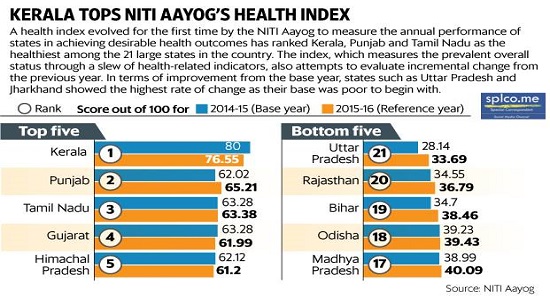Kerala, Punjab and Tamil Nadu were the top rankers in NITI Aayog’s latest Health Index report which has, for the first time, attempted to establish an annual systematic tool to measure and understand the heterogeneity and complexity of the nation’s performance in the health sector.

NITI Aayog (National Institution for Transforming India Aayog) will replace the 64-year old Planning Commission. The Aayog will recommend a national agenda, including strategic and technical advice on elements of policy and economic matters.
The Health index eport has a disclosure that is not pleasing for ruling benches that is in the bottom five list are the bjp ruled states Rajasthan Uttarpradesh Bihar Madyapradesh remains.
The report was released on Friday by Amitabh Kant (CEO of NITI Aayog), Preeti Sudan (secretary, Ministry of Health and Family Welfare) and Junaid Ahmad (country director, World Bank). The next report will be released in June this year and district hospitals too would be ranked.
“We would rank 730 district hospitals based on their performance. We want to encourage the good performers and name and shame those who aren’t,” said Mr. Kant.
Manipur registered maximum incremental progress in indicators such as PLHIV on ART, first trimester antenatal care registration, grading quality parameters of Community Health Centres, average occupancy of key state-level officers and good reporting on the Integrated Disease Surveillance Programme (IDSP).
Lakshadweep showed the highest improvement in indicators such as institutional deliveries, TB treatment success rate, and transfer of National Health Mission funds from the state treasury to implementation agency.
“Kerala ranks on top in terms of overall performance but sees the least incremental change as it had already achieved low levels of Neonatal Mortality Rate, Under-five Mortality Rate and replacement level fertility, leaving limited space for any further improvement,” noted the report.
“Common challenges for most States and Union Territories include the need to focus on addressing vacancies in key staff, establishment of functional district cardiac care units, quality accreditation of public health facilities and institutionalisation of human resources management information system. Additionally, almost all larger states need to focus on improving the Sex Ratio at Birth,” explained Mr. Kant.
“This Index is expected to nudge states towards further achieving a rapid transformation of their health systems and population health outcomes.” he added.














